Staging a protest
The New York Times dispatched Robert Pear to cover a massive anti-war demonstration held in Washington's Lafayette Park behind the White House on Saturday, August 12. This is not Mr. Pear's regular beat: Medicare, health insurance, giant pharmaceuticals, these he cares about; the war in Lebanon, not so much. Under the title Rally Near White House Protests Violence in Mideast, he suggests an anemic gathering deluded with fanciful notions ("strident" Ramsey Clark's daring thought that the current US administration should be held accountable for carnage in the Middle East) whose desiderata were hopelessly at odds with the will of Congress, "where support for Israel is overwhelming and bipartisan." Nor can Pear resist noting that President Bush was in Crawford, thus even more immune to protest -- if further immunity can be imagined -- than usual. Andrew Council's accompanying photo feeds readers what they want and expect: an image showing not Regular Guys Like Us at the protest, but rather a Shi'ite imam leading worshipers in prayer. Rather different images are available on the website of the event's main sponsor, the A.N.S.W.E.R. Coalition, which estimates crowd size at 30,000.
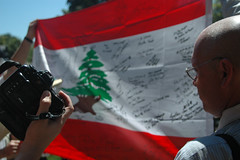
The Washington Post's account, on the other hand, is a more reasonable reflection of the event, both its mood and message. But Post bloggers rightly objected to the "guilt by association" description of the A.N.S.W.E.R. Coalition as "a left-wing group that has sponsored numerous antiwar rallies that often attract socialists and anarchists. " The Post's video montage, captured if not edited by Akira Hakuta, is artfully done, though it fails to convey both the sheer size of the crowd and one startling aspect of its diversity. Looking out from the stage, the camera pans right to left, then cuts abruptly to a different scene just as we begin to see the posters of the group whose front-and-center presence would surely have surprised most spectators and readers (of this more anon). Most egregiously, the montage promotes the inference that the crowd was booing the DC police, since the frame focuses on the mounted Park Police just as the crowd is reacting to Bush's favorite new racist rant on "Islamo-fascism."
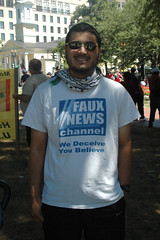
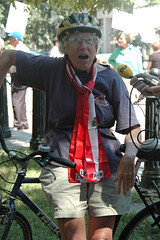

One articulate reader ("rschreitz") objected as follows: "[The article] says far too little about the concerns of the thousands who participated in the march and far too much about the reactions of two non-participants. [...] What is the full name of the primary sponsor? What do the initials ANSWER stand for? What did the speakers say during the nearly two hours of speeches that preceded the march? What were the recurring themes? Thousands of people gathered in front of the White House to send a message. Many of them traveled hundreds of miles to be there. What was their message? Yes, they did object to President Bush’s use of the term “Islamic facism”. But their objections went far beyond that. There were justifiable objections to our unconditional support for Israel. There were justifiable objections to Israel’s disproportionate response in the Israeli-Hezbollah conflict, a response that violates international law, and to our failure to intervene."
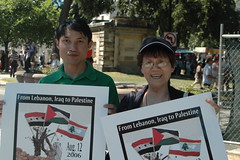
Several readers emphasized the "diversity" of the crowd, and it is precisely this aspect which the mainstream press coverage has most not so much failed to capture as actively contrived to obscure. Now, I am not ordinarily the first on my block to subscribe to theories of dark conspirations, but having been present at the demonstration and seen it with my own eyes, I find the censorship of the Times and the Post utterly mystifying.
Here's why: both versions have been ethnically cleansed of Jews. A Times or Post reader would never guess that a large delegation from a New York City orthodox congregation was present in the front row throughout the two hours of speeches holding up signs condemning "Zionist atrocities in Gaza and Lebanon," or that this same delegation marched together, arm in arm, around the White House, with all the other protesters, or that at the end of the march, the organizers asked from the stage for people to help their orthodox brothers dispose of their signs, since on the Sabbath they could not undertake that labor themselves.
Other marchers self-identified as Jewish, and there were plenty of African Americans, Asian Americans, European Americans, and Latin Americans visible and vocal. There was a presentation by a speaker from South Korea, a Venezuelan speaker praising Hugo Chavez, and a Cuban speaker who spoke about Guantanamo Bay.
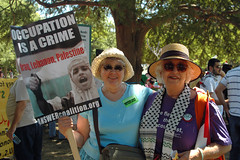
Equally strange is the Washington Post's description of the marchers' brush with the counter-protesters: "'There is no other God but Jesus!' shouted one of the counter-protesters. He held a megaphone in one hand, a Bible in the other." I did not see that particular protester among the twenty-aught, but I can confirm that his message was not that of the majority.
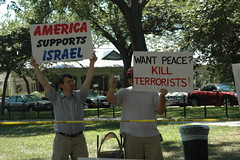
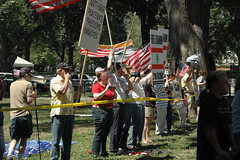
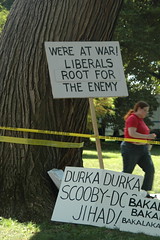
As the marchers were returning to Lafayette Park after circling the White House, I asked the Orthodox Jewish group if they would be willing to discuss their views with me. I already knew that they did not believe in Zionism -- that is, they did not believe that Judaism should entail the creation of a state, a political entity. There is a famous rabbi who writes often against Zionism, and makes a lot of people angry. I said that I was a strong supporter of the rights of the Palestinians to a national homeland and that the attacks on Lebanon horrified me. However, the rights of any people to self-defense seemed to me self-evident, and I wondered how these Orthodox believers envisioned survival in a hostile world if they renounced the right to form a state, raise taxes, and maintain an army.
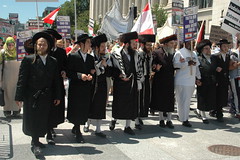
The young man who answered me said that Jews should rely for their security on God alone; that they could not be believers only when it suited them, but that they must be believers all the time and with their whole hearts. This was all very nice, but what about the centuries of persecution of Jews who did believe, and who yet were not protected. Isn't it reasonable that a worldly menace should be met with a worldly defense? The young man seemed to say that the tormentors of Jews had been sent by God, and that the only protection Jews could have was through perfect faith in him. Besides, he said, if a man goes to take a bus which is supposed to come at 3:00, if the bus is late, maybe he'll wait 10 minutes, and maybe he'll wait half an hour, but he will never wait for 60 years. For 60 years, he said, Jews have been looking for their security to the state of Israel, yet all we have is more bloodshed.
It was surely a courageous choice on their part to participate in the march. I can imagine that they are considered traitors in some circles.
I thanked the young man for his explanations and his presence. He invited me to visit Neturei Karta's website to learn more about their beliefs. Although it was good for the pro-Lebanon march that the group were there, their idealism is not matched, I think, among any of the other parties. It certainly takes a lot of faith -- far more than I ever had -- to renounce your right to self-defense and put your trust in the Almighty.
What is finally regrettable, however, is that neither this young man's beliefs nor his brave appearance at the march will ever find their way into the consciousness of readers of the New York Times or the Washington Post. For the mainstream American press is so unwilling to expose the American public to the diversity of Jewish and Israeli opinion that they actually suppress footage which their photographers and videographers could not have helped but capture. Why is that?
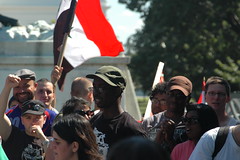
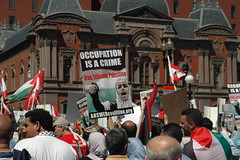

The Washington Post's account, on the other hand, is a more reasonable reflection of the event, both its mood and message. But Post bloggers rightly objected to the "guilt by association" description of the A.N.S.W.E.R. Coalition as "a left-wing group that has sponsored numerous antiwar rallies that often attract socialists and anarchists. " The Post's video montage, captured if not edited by Akira Hakuta, is artfully done, though it fails to convey both the sheer size of the crowd and one startling aspect of its diversity. Looking out from the stage, the camera pans right to left, then cuts abruptly to a different scene just as we begin to see the posters of the group whose front-and-center presence would surely have surprised most spectators and readers (of this more anon). Most egregiously, the montage promotes the inference that the crowd was booing the DC police, since the frame focuses on the mounted Park Police just as the crowd is reacting to Bush's favorite new racist rant on "Islamo-fascism."



One articulate reader ("rschreitz") objected as follows: "[The article] says far too little about the concerns of the thousands who participated in the march and far too much about the reactions of two non-participants. [...] What is the full name of the primary sponsor? What do the initials ANSWER stand for? What did the speakers say during the nearly two hours of speeches that preceded the march? What were the recurring themes? Thousands of people gathered in front of the White House to send a message. Many of them traveled hundreds of miles to be there. What was their message? Yes, they did object to President Bush’s use of the term “Islamic facism”. But their objections went far beyond that. There were justifiable objections to our unconditional support for Israel. There were justifiable objections to Israel’s disproportionate response in the Israeli-Hezbollah conflict, a response that violates international law, and to our failure to intervene."

Several readers emphasized the "diversity" of the crowd, and it is precisely this aspect which the mainstream press coverage has most not so much failed to capture as actively contrived to obscure. Now, I am not ordinarily the first on my block to subscribe to theories of dark conspirations, but having been present at the demonstration and seen it with my own eyes, I find the censorship of the Times and the Post utterly mystifying.
Here's why: both versions have been ethnically cleansed of Jews. A Times or Post reader would never guess that a large delegation from a New York City orthodox congregation was present in the front row throughout the two hours of speeches holding up signs condemning "Zionist atrocities in Gaza and Lebanon," or that this same delegation marched together, arm in arm, around the White House, with all the other protesters, or that at the end of the march, the organizers asked from the stage for people to help their orthodox brothers dispose of their signs, since on the Sabbath they could not undertake that labor themselves.
Other marchers self-identified as Jewish, and there were plenty of African Americans, Asian Americans, European Americans, and Latin Americans visible and vocal. There was a presentation by a speaker from South Korea, a Venezuelan speaker praising Hugo Chavez, and a Cuban speaker who spoke about Guantanamo Bay.

Equally strange is the Washington Post's description of the marchers' brush with the counter-protesters: "'There is no other God but Jesus!' shouted one of the counter-protesters. He held a megaphone in one hand, a Bible in the other." I did not see that particular protester among the twenty-aught, but I can confirm that his message was not that of the majority.



As the marchers were returning to Lafayette Park after circling the White House, I asked the Orthodox Jewish group if they would be willing to discuss their views with me. I already knew that they did not believe in Zionism -- that is, they did not believe that Judaism should entail the creation of a state, a political entity. There is a famous rabbi who writes often against Zionism, and makes a lot of people angry. I said that I was a strong supporter of the rights of the Palestinians to a national homeland and that the attacks on Lebanon horrified me. However, the rights of any people to self-defense seemed to me self-evident, and I wondered how these Orthodox believers envisioned survival in a hostile world if they renounced the right to form a state, raise taxes, and maintain an army.

The young man who answered me said that Jews should rely for their security on God alone; that they could not be believers only when it suited them, but that they must be believers all the time and with their whole hearts. This was all very nice, but what about the centuries of persecution of Jews who did believe, and who yet were not protected. Isn't it reasonable that a worldly menace should be met with a worldly defense? The young man seemed to say that the tormentors of Jews had been sent by God, and that the only protection Jews could have was through perfect faith in him. Besides, he said, if a man goes to take a bus which is supposed to come at 3:00, if the bus is late, maybe he'll wait 10 minutes, and maybe he'll wait half an hour, but he will never wait for 60 years. For 60 years, he said, Jews have been looking for their security to the state of Israel, yet all we have is more bloodshed.
It was surely a courageous choice on their part to participate in the march. I can imagine that they are considered traitors in some circles.
I thanked the young man for his explanations and his presence. He invited me to visit Neturei Karta's website to learn more about their beliefs. Although it was good for the pro-Lebanon march that the group were there, their idealism is not matched, I think, among any of the other parties. It certainly takes a lot of faith -- far more than I ever had -- to renounce your right to self-defense and put your trust in the Almighty.
What is finally regrettable, however, is that neither this young man's beliefs nor his brave appearance at the march will ever find their way into the consciousness of readers of the New York Times or the Washington Post. For the mainstream American press is so unwilling to expose the American public to the diversity of Jewish and Israeli opinion that they actually suppress footage which their photographers and videographers could not have helped but capture. Why is that?


